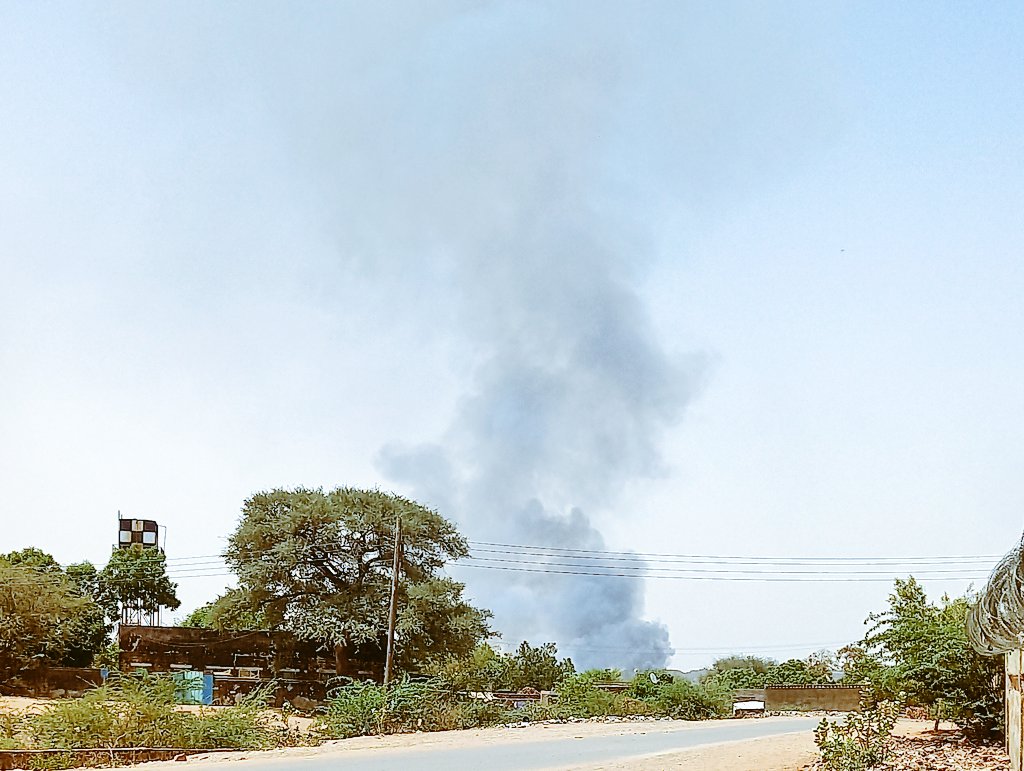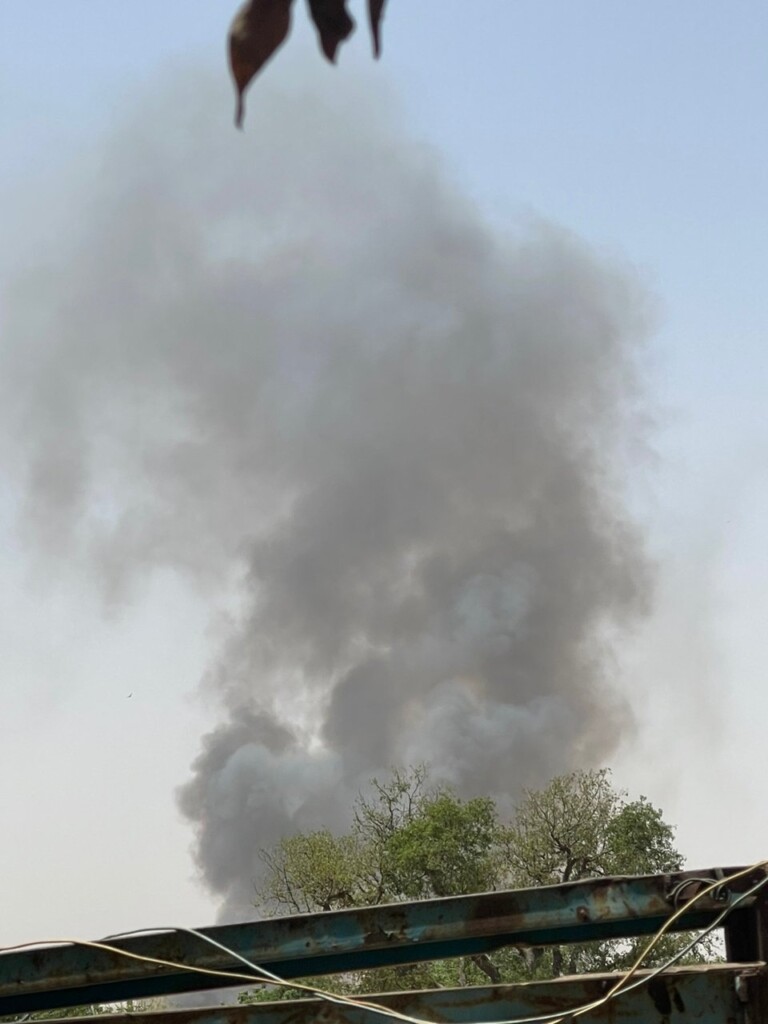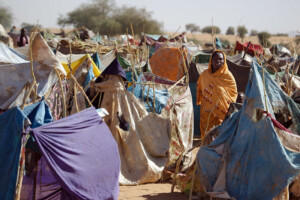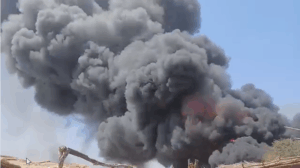Darfur update: clashes in El Geneina, extended truce in El Fasher, and popular initiatives in Nyala

Smoke rising above El Geneina, at the end of April 2023 (social media)
EL GENEINA / EL FASHER / NYALA – April 25, 2023
Fierce clashes between the army and the Rapid Support Forces (RSF) renewed in El Geneina, capital of West Darfur, yesterday morning. In North Darfur, army and RSF commanders agreed to extend an initial three-day civilian-brokered ceasefire in state capital El Fasher. In Nyala, civil initiatives have also led to relative calm.
A civilian-brokered ceasefire in El Geneina has not held up. Buildings of government institutions that were used as safe shelters by displaced people were reportedly burned and gunfire can be heard around the city
A resident called Ibrahim told Radio Dabanga from the city that the clashes started in the El Jamarik neighbourhood, where the main RSF base is located, at about 8:00 yesterday and continued for hours “with all kinds of weapons”.
Most people living in El Jamarik fled their homes. The scope of the clashes expanded and reached the main police station of the city, where columns of smoke rose in the sky.
The Together for Stability in West Darfur Initiative said in a statement yesterday that it had agreed with the traders at El Geneina Grand Market that they would open their doors again that morning because the city was relatively calm in the past days. They were however surprised by the firing of gunshots as clashes erupted.
The initiative, which “includes various components of society”, appealed to the residents of El Geneina “to confront any criminal behaviour”. They called on “the commanders of the security forces in general, and the leaders of the army and the RSF in particular, to exercise self-restraint and ensure the safety of society and spare the state from slipping into a comprehensive security chaos”.
On Saturday and Sunday, various armed robberies were reported by the passengers of four vehicles on the Murnei-El Geneina road.
Sources told Radio Dabanga that gunmen intercepted three commercial vehicles south of the Sese camp for the displaced on Sunday and robbed the passengers of their cash and telephones at gunpoint.
Near the same location, shots were fired at the tires of a lorry carrying vegetables and, last Saturday, the passengers of a commercial vehicle were robbed as well.
An office of the Sudanese Red Crescent was reportedly damaged as a result of the clashes today.
Yousra Elbagir, Africa correspondent for Sky News, reported that the United Nations and NGOs evacuated their international staff from El Geneina but left behind Sudanese nationals.
“One young Sudanese man who relocated for his NGO job with War Child is stuck amongst intensified armed militia violence with only the shelter of his room for safety,” she wrote on social media.

El Fasher truce
In North Darfur, army and RSF commanders agreed to extend an initial three-day ceasefire in the North Darfur capital of El Fasher for an indefinite period on Sunday evening, following mediation of the Good Offices Committee.
On Sunday, the Good Offices Committee in El Fasher contacted commanders of the Sudan Armed Forces (SAF) and RSF in the area to broker a continuation of the three-day ceasefire agreed on Thursday.
The committee, which includes imams, native administration leaders, activists, and the governor of North Darfur, Nimir Abdelrahman, was able to convince the two sides to agree on a ceasefire last Thursday.
According to the initial agreement, the army would stick to its positions west of the city and the RSF east of the city, provided that the central area be a buffer between the two parties and demilitarised under police administration.
Abdelrahman now stated on his Facebook page that the parties agreed to leave the task of protecting markets, banks, and public facilities to the police forces, while the tasks of protecting western neighbourhoods and the offices of international missions and organisations were entrusted to forces of the rebel movements that signed the Juba Peace Agreement in October 2020.
Most parts of El Fasher witnessed a cautious calm yesterday, except for gunfire at the northern entrance to the city, Fatima El Fadul told Radio Dabanga.
She said that the decision to extend the ceasefire for an indefinite period of time “found a great response among the people”.
Shops and bakeries opened their doors again yesterday and the water and power provision returned as normal.
Yet, she expressed her fear of renewed clashes and concerns around the lack of steadfastness in the declared ceasefire between the parties.
‘The prices of drinking water doubled’
El Fadul also reported a significant increase in the prices of consumer goods since the clashes. “The prices of drinking water doubled. The price of a pound of sugar rose from SDG300 to SDG 500, and we now pay SDG500 instead of SDG200 for transportation within the city”.
The international president of Médecins Sans Frontières/Doctors Without Borders, said that MSF is not leaving Sudan and that the organisation is still working in a few hospitals in the country and providing supplies to others.
“A hospital we support in El Fasher continues to receive wounded people and a surgical team is doing back-to-back surgeries. Staff are exhausted,” he wrote on Twitter.
Nyala initiatives
Popular initiatives were launched by journalists and civil society activists in the South Darfur capital Nyala to appeal to the army and RSF to stop the war, the South Darfur Radio Dabanga correspondent reported on Sunday.
“Nyala is witnessing a remarkable calm since Saturday. The provision of electricity stabilised as well. People are leaving their homes to buy basic necessities, though many shops and government institutions remain closed,” he said.
‘Nyala is witnessing a remarkable calm since Saturday’
“The street vendors who depend on their daily income are back on the streets again. Most of the people who fled their homes returned, except for those who live in El Matar [airport] neighbourhood.”
Here too, commodity prices increased. The correspondent explained that many prices tripled. “The price of two buckets of water rose to SDG500 instead of SDG150 last week.”
The RSF reportedly still control Nyala Airport. The SAF have a heavy military presence inside the city.











 and then
and then